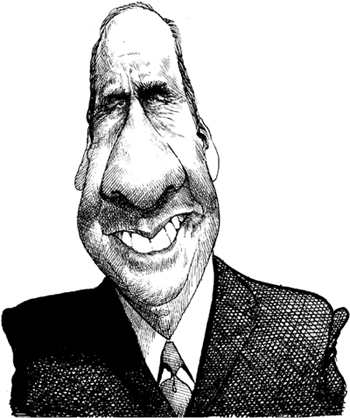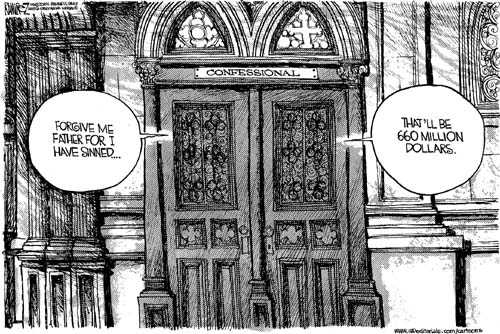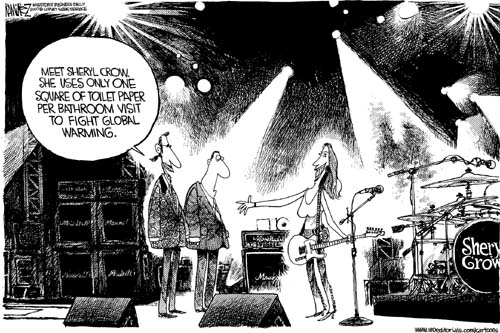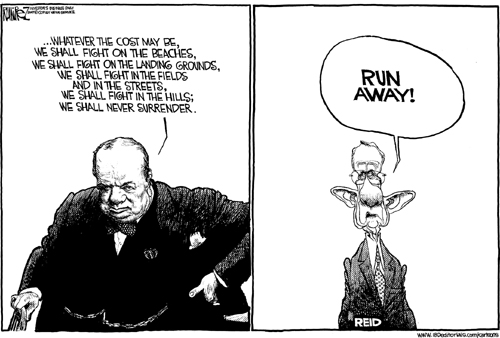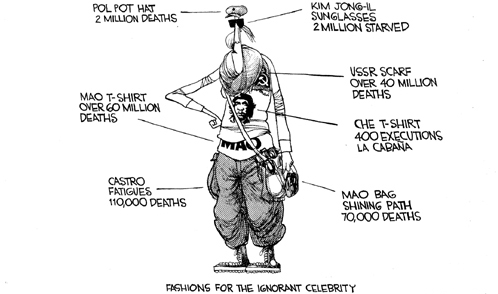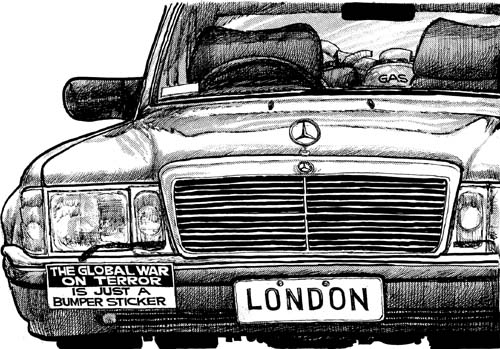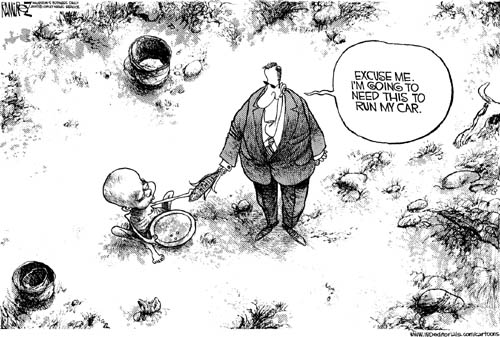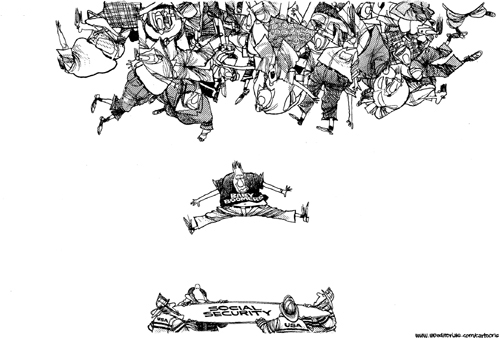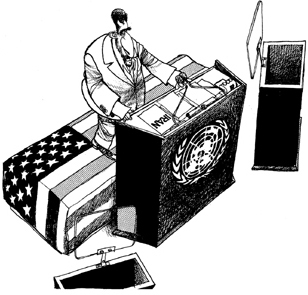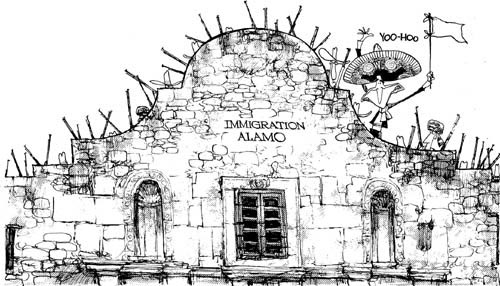Michael Ramirez of the conservative Investors Business Daily won the Pulitzer Prize in 2008 for this portfolio of twenty cartoons from 2007. It is the second Pulitzer Prize for Michael, who also won in 1994 when he worked for the Memphis Commercial Appeal.
It is interesting that the award comes at this time because Michael was recently laid off from his job as cartoonist for the Los Angeles Times, which now has no editorial cartoonist. The Tribune Company owns The LA Times, The Baltimore Sun, and The Chicago Tribune, all newspapers with a rich tradition of editorial cartooning that no longer employ an editorial cartoonist.
Our congratulations go out to our friend, Michael and to the Investors Business Daily for this well deserved honor. Michael has a new book, “Everyone has the Right to My Opinion,” that is coming out at the same time as our “Best Political Cartoons of the Year” book. Michael has given us some excerpts from the introductions to his book to share here with his winning cartoons.
I’m an editorial cartoonist. I’m not a writer. If I could write I would be a columnist.
My publisher wanted me to recount stories like the time I won my first Pulitzer and I was greeted at the award ceremony at Columbia University by an enormous protest. Several protestors approached our car. I realized they had no idea what I looked like when they handed me a flyer protesting myself. So I joined the picket line. I may be the only Pulitzer Prize winner who has protested himself.
Or the time I was investigated by the Secret Service over one of my cartoons.
Or the time I was in Havana interviewing the Minister of Information. He refused to answer questions about imprisoned journalists, censorship, the Brothers in Arms flight that was shot down in international airspace, or the tugboat full of Cuban refugees that was capsized outside of Havana Harbor drowning most of its occupants.
I brought up the elaborate political process Cuban journalists had to go through to get into print. I brought up the fact that Cuban editorial cartoonists could not draw cartoons of Fidel or Che Guevara. I told him in the United States we believe a country that cannot make fun of its leaders is usually a country imprisoned by its leaders. I asked him one last question, the camera zooming in on his face, “What is your favorite Fidel Castro joke?” His face went ashen. He was speechless. And I got my answer.
It was the same answer William M. Tweed and Tammany Hall gave 120 years earlier in reaction to Thomas Nast’s cartoons. Boss Tweed was a little more vociferous in his condemnation, “Stop them damn pictures. I don’t care so much what the papers say about me. My constituents don’t know how to read, but they can’t help seeing them damned pictures!” It was clear the Castro regime recognized the power of the pen.
... Editorial cartoons are a check to the erosion of our liberties and a first line of defense to the advance of the unrestrained power of government. One good editorial cartoon can have a significant impact on the political dialogue of the day. If done well, it can influence those who govern to govern responsibly, and expose them when they do not.
Einstein once said, “Two things are infinite: the universe and human stupidity; and I’m not sure about the universe.” Einstein was right. It is this axiom which makes political cartooning important. The people who ultimately govern will make mistakes. They are human after all. But history has demonstrated that power can turn leaders into monsters. Editorial cartoonists will gladly point out the shortcomings of the powerful in an effort to keep them human.
And while it is quite remarkable that cartoons can have such an impact, it is equally remarkable and short-sighted that newspapers, in their infinite wisdom, are relinquishing this influence and abandoning the position of editorial cartoonist. H.L. Mencken, once said, “Give me a good cartoonist and I can throw out half the editorial staff.” Poll after poll has demonstrated, of the people who read the editorial page, the editorial cartoon continues to be the most popular feature on the page.
Part of the damage is self-inflicted. Where the modern trend in editorial cartooning has been to make simple jokes about current affairs, humor without a substantive statement diminishes the importance of the editorial cartoon. Editorial cartoonists who don’t take their jobs seriously should not expect to be taken seriously.
An editorial cartoon is not just a “funny picture.” An editorial cartoon is a fine instrument of journalism. At times, it is sharp and refined, its message cutting quickly to the point, at times blunt, with its dark imagery seizing the readers’ attention.
As with any editorial, the cartoon has a point. It tells a story. It defines an issue. It challenges hypocrisy. It reveals the best and the worst of humanity. It calls the reader to arms against the complacent, the lethargic, the evildoers, the indolent body politic, and the champions of the status quo. It exposes the assorted predators of society.
An editorial cartoon is not humorous for the sake of humor. It is not controversial for the sake of controversy. It is neither conservative nor liberal. Whether you agree with it philosophically or not, a good editorial cartoon engages the reader in debate. It informs and challenges. It draws the reader into the democratic process.
– Michael Ramirez
I should add that I was with Michael in Havana when he asked the Cuban Minister for his favorite Castro joke. After going silent and ashen, as Michael describes, the Minister told us that there were no Castro jokes, because Cubans wouldn’t think jokes about Castro were funny. When we went back to our hotel, Michael drew a lovely cover on his blank sketchbook with the title “Fidel Castro Joke Book.” Of course, the joke was that the all the pages in the “Fidel Castro Joke Book” were blank. We went back and Michael presented the book as a gift to the Minister, who didn’t think it was very funny.
I thought it was funny.
–Daryl Cagle

